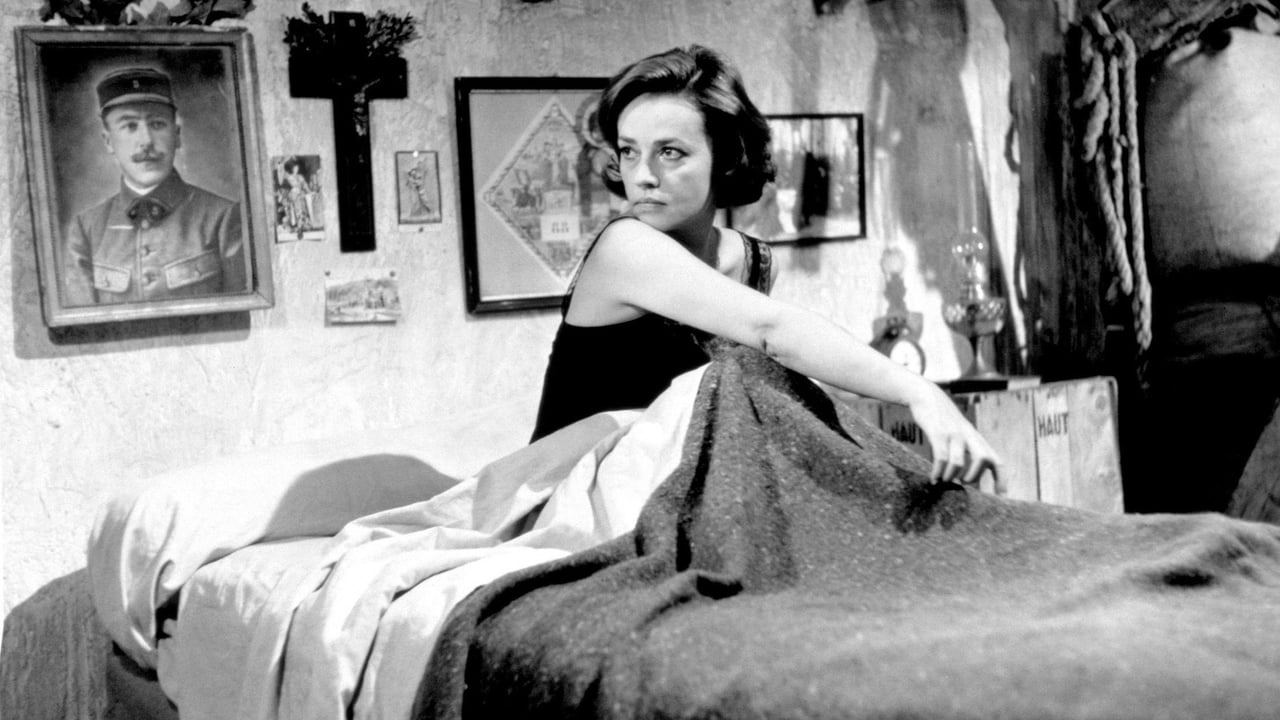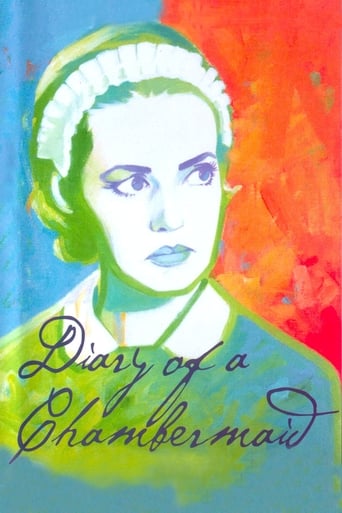Titreenp
SERIOUSLY. This is what the crap Hollywood still puts out?
ScoobyWell
Great visuals, story delivers no surprises
Pacionsbo
Absolutely Fantastic
InformationRap
This is one of the few movies I've ever seen where the whole audience broke into spontaneous, loud applause a third of the way in.
elvircorhodzic
DIARY OF A CHAMBERMAID is a crime comedy, which on a surreal way connects a radical politics, corruption, violence, and sexual perversions. Mr. Buñuel is not making fun of some kind of tradition, he just points to the shocking background of a provincial town.Célestine is an ambitious and attractive maid, from Paris, who comes to work for a Normandy estate. Her hosts are crazed, violent and perverse. The elderly father is a harmless old fetishist, his daughter is a frigid and meticulous woman, while her husband can't keep his hands off the servants. Here are their servants and a neighbor, retired Army officer, who shares his bed with a chubby maid. Célestine must wisely choose men who surround her...The story is placed in the middle of the 1930s. A woman has completely disrupted relations and instincts between other protagonists in this film. It's kind of a surreal view on a provincial environment and the relation between a nationalism, petty bourgeois and religion.Mr. Buñuel has put a strange household in the correlation with the French social structure. Characterization is very good. Completely different characters fight, in a surreal atmosphere, to achieve their ambitions. However, the epilogue is more than realistic.Jeanne Moreau as Célestine is a smart and very capable woman. She pushes her temperament in the right direction. She has become an essential part in the lives of people and hostile environment that surrounds her. She waited patiently for the right opportunity to remove a "rotten tissue" and realize her ambition. Ms. Moreau offered very good performance.This is, perhaps a little unclear story, but it is an effective and fun experience.
christopher-underwood
This wonderful film seems deceptively simple at first, as Jeanne Moreau plays an attractive maid, coming from Paris to work for an eccentric family in the country, and begins to interact with the various family members and other servants. The wife is meticulous, fussy and unwilling to partake of sex with her husband, who in turn makes advances elsewhere, as and when he can. The senior member of the family is a curious old thing who asks the chambermaid up to read to him but then gradually reveals that his real passion is foot fetish. Bunuel has said this is his most erotic film and as there is no sex, we can safely assume he shared the same passion. The walk around the bedroom in leather boots with skirt raised certainly comes from somewhere fairly intense. Then, there is the gamekeeper, a knowing, wily chap who hates foreigners, is anti-Semitic and represents the coming fascism, which is made brutally clear at the end, whether or not he is guilty of the terrible crime at the centre of the film. I think you could safely say that Bunuel was more than a little unhappy with the French nation at this point, poking at all classes and the judiciary and government, but so beautifully done you might not even notice.
Galina
I am surprised that the film has been often mentioned as Bunuel's minor film or even the closest to failure he'd come. I found it excellent - dark and cynical, funny and thought provoking. It's got everything I love Bunuel's films for – sinister atmosphere, darker than dark humor, the strange characters living lives of sexual, religious, and social repressions. Jeanne Moreau, one of the greatest actresses France ever produced, as a titular chambermaid, Celestine adds to the film's many pleasures. Bunuel and his screenwriter Jean-Claude Carrière have transported the Octave Mirbeau's novel from the 19th century to the 1930s – the epoch of Bunuel's first sojourn in France where he made his first two films. Celestine, a sexy and cool Parisian takes a job as a chambermaid to a bourgeois, provincial family with enough skeletons in the closet for a small cemetery. The irritable and arrogant wife is frigid, her husband (hilarious turn by Michel Piccoli) chases anything in skirt and her nice and well mannered father is a shoe-fetishist. There is also a neighbor, an ex-officer who hates Monteils and loves damaging and breaking his neighbors' things and property."Diary of a Chambermaid" (among many things) was able to show the absolute evil on the raise in the character of Joseph, the farm-laborer, who is sexually attracted to Celestine, a cruel, cold-blooded rapist-murderer and the fascist in such subtle yet scary way that Bertolucci should have watched and studied it for his "1900".
José Luis Rivera Mendoza (jluis1984)
Luis Buñuel, the man considered Spain's finest filmmaker and revered master of surrealism by both critics and film historians, made a surprising change of style in the first of the series of masterpiece she did in France during his last years. Taking out his usual surrealist set-pieces, he adapts Octave Mirbeau's revered novel about social classes in a very straight-forward fashion. However, this does not mean the movie is bad as many may believe; quite the opposite, "Le Journal d'eune Femme de Chambre" is a perfect showcase of Buñuel's finest film-making style, ambiguous and stylish, like the master's own vision of life.The plot follows Celestine (Jeanne Moreau), an urban young woman moving to country in 30s France to work as a chambermaid for the Monteils, a rich family with a few dark secrets. As soon as she arrives, problems start as she tries to adapt to her new life with the bizarre Monteils. Between the constant advances of sexually insatiable Monsieur Monteil (Michel Piccoli), the always vigilant eye of his materialist wife (Françoise Lugagne) and the shoe fetish of old Monsieur Rabour (Jean Ozenne); Celestine makes her way through this collection of living portraits of the most bizarre human nature.With a plot like this it would easy to believe this is a movie where the high class is demonized and the poor sanctified, but this is not the case here. Buñuel makes sure to have an ambiguity in every character, even in Celestine herself. There is no black and white, just different shades of gray, in a way similar to the beautiful black & white photography he uses here.The photography is essential in this film; not only for aesthetic purposes, it represents the dark decadent days of 30s Europe, and the pessimism latent in both rich and poor people. As I wrote above, the shades of gray match perfectly the ambiguity of a group of characters with as many virtues as flaws. Buñuel and his cast manage to create believable and realistic characters.Jeanne Moreau gives a brilliant performance as Celestine. As the beautiful young city woman highly intelligent and not without aspirations, her character has enough room to let her shine, and she really makes the most of it. Equally brilliant is Georges Géret as Joseph, the tough gardener with fascist ideals that has a secret agenda. The rest of the cast is also very good and together with the witty script complete a superb character-driven movie.Buñuel's masterful direction creates a film that, while completely focused on the characters, is still filled with his usual symbolism. The edition and the camera-work are superb and way the camera seems to flow inside the house gives the film a voyeuristic feeling. No wonder why Buñuel consider it a very erotic film.While many people consider this movie as one of his "lesser works", I consider it to be quite underrated, as it proved that Buñuel was a master not only of surrealism, but of film-making in general. 9/10

